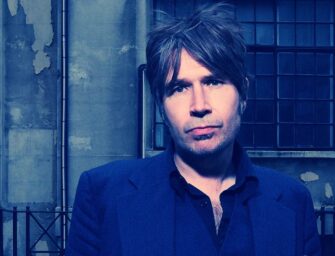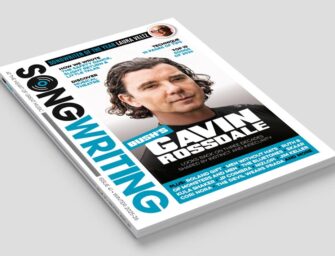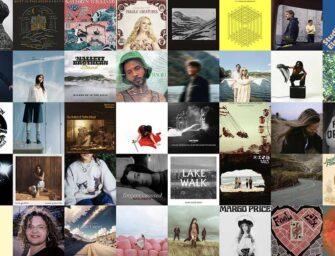
Benjamin Booker: “I don’t write songs unless it’s something meaningful to me”
We catch up with the soulful American rocker to learn how a trip to Mexico City inspired his new record
When Benjamin Booker burst onto the garage rock scene with a Violent Shiver in 2014, his arrival felt like a genuine shot in the arm for the genre. His self-titled debut album was rightly lauded as an explosive dose of amped-up blues from the Virginia Beach-born artist and announced him as a talent to be closely watched.
Subsequently, though, it turns out that Booker wasn’t happy with his life in New Orleans and in the press material for his new album he describes himself as being “a songwriter with no songs”. Witness, a genre-expanding evolution in sound, was born from his decision to flee the city and fly to Mexico City, a place where he could neither speak the language nor knew anyone, where solitude and freedom could help him rediscover his muse.
We had a chat with Booker during his recent visit to London to talk about the soul-searching road that led him back to songwriting…
Congratulations on the new album!
“I’m very excited about it. The last album was one of those records where I didn’t know that it was going to be seen by anyone. This time, because I knew that people would do, I tried to really put everything into it and I feel really proud of it.”
Can you remember the exact point when you began writing again?
“I was on the plane and I was reading White Noise by Don Delillo, an amazing book, and I came across a sentence ‘What we are reluctant to touch often seems the very fabric of our salvation.’ At that point I took out a piece of paper and I was like, ‘Okay Ben, for once in your life be honest with yourself about the person you are and your faults and problems and the things you really need to address,’ and I made a bullet-pointed list of all those things and wrote them down and that basically became the different tracks on the album.”
You then kept that list on you in Mexico and referred back to it?
“Correct, I just referred back to it for the different songs that I was writing. It’s really crazy because I always have problems and it just felt amazing on that plane – everything kind of fell into place a little bit.”
Where did you tend to write previously?
“I’m one of those people who can’t just sit down and write a song. I don’t write songs unless it’s something meaningful to me, so it’s hard to just pick a topic and sit down and write about it. It’s usually when there’s an overwhelming feeling that I have to get out, then I’ll pick up a guitar and write something. For the last album, a song like Violent Shiver was written in like five minutes, just like an immediate ‘this is what’s coming out right now’ kind of thing and that’s usually the way that I write songs. I don’t usually spend a lot of time pouring over songs. I wait for them to come in.”
What’s the next step in that process?
“Well, I think that you just have to sit with them for a while. The thing about Mexico, just being alone and isolated and not being able to speak Spanish, meant I basically spent a month in silence. The nice thing was that all of those things, the list and all of those things, I spent a lot of time walking around the city sitting in old cathedrals and museums and things like that. It was the first time in a long time that I had time to myself to think about where I was at that point and I think it was easier to write. Everything came together in a very short period because I had more time than ever to sit and be quiet.”
Were you recording songs at that point?
“I recorded a bunch of demos when I was there and then I found Sam [Cohen] from listening to the Kevin Morby record that I loved. I met with Sam about a month after recording and we had three days when I came in with the demos and we just edited the songs, which was really nice. I think it’s really important to spend a lot of time editing yourself and being honest about what is good and what is bad. We both had the intention of trying to make the best songs that we could. Some of the songs went from five or six minutes to two-and-a-half minutes, we just really cut stuff out and tried to save the best bits.
“Off The Ground is the one I’m thinking about, that song was six-and-a-half minutes long. We cut it down. A lot of them were like that. I also wanted ten songs on the album specifically, I just wanted to have time to focus on them and make sure that they were good. I didn’t want filler songs.”

Booker: “Even if I’m scared to do it I’d rather put myself out there than put out bad music.”
Yet the album includes a lot of different genres, like soul and gospel. Was that a deliberate decision?
“Yeah totally. I started listening to a bunch of different music over the last couple of years and I think I was more focused on the rhythm this time because I’d been listening to a lot of funk music from Nigeria and also the Sly & The Family Stone album called Fresh. I was listening to a bunch of hip hop also, so when we were recording the album anything that I came in with that was maybe more punk and like the last record we broke apart and I tried to get a groove going. It was a whole different mindset that was a little hard to adjust to but I was very happy with the end results.”
Do you think you can hear Mexico City in there at all?
“There was more Mexico City in the demos. If you heard the demos you’d definitely get a bit of that influence in there but it got a little filtered out during the process of editing the songs. We didn’t go into the studio with any plan of how we were going to record the songs, when I was working with Sam the focus was just on the chord progressions and the structure of the song and the lyrics and melodies. Just the bare bones of the songs and that’s the most important thing to me, that you can play the song with just one instrument and sing it, that’s when you know that it’s a good song. When we got to the studio we would just try the songs out in a bunch of different ways until we found something that we were happy with. But we didn’t go in with anything except what we thought were good songs.”
How long did it take to get them to the point that you were happy with them?
“Sometimes we did like twelve different ways. I had two weeks to record the album, we spent a week in Woodstock, New York and a week in Brooklyn, New York. I think the majority of the album was probably done in about four days, it was pretty quick. The rest of the time was spent editing it, taking things out and adding little parts and things like that.”
Does that editing process take away from the immediacy at all?
“I definitely enjoyed the first album but when I listen back to it now I wish that I had done more editing and so that was the focus this time, to have the best things on the album.”
It also covers issues like police brutality and racism, was that easy for you to write about?
“The fear of being a bad artist outweighed my fear of exposing myself. So even if I’m scared to do it I’d rather put myself out there than put out bad music.”
Does your writing style change at all depending on the subject matter?
“It’s a very different process to last time. Honestly, the point of my life was pretty rough writing the first album and I don’t even remember writing most of those songs. So this was a very different experience, I was very much present for all of the songwriting. It was a hazy few years of my life that I don’t really remember.
“I think that you really need to be completely focussed to be able to write. When people talk like ‘oh I need to drink or smoke to write’, I don’t think you can write good songs like that. For me at least, I need to be present.”
But going back to a song like Violent Shiver, that has a distinct energy to it. Can you capture that if you’re not in the moment?
“That riff was literally the first thing that I wrote when I picked up the guitar. The words were written and the song came together in five minutes, I can’t even explain to you. That’s why it takes me forever to write songs, I just wait for the song. I can’t sit down and write. I have tried to do it but they’re just all terrible, it just feels forced and doesn’t feel real.”

Benjamin Booker: “It’s important to me not just to be an entertainer.”
We’re guessing you have no desire to be a backroom songwriter then?
“Those people can’t be happy, it’s bullshit.”
If you’re writing a song about a specific incident that’s happened to you, does that memory then change once it’s become a song?
“I think that it’s just weird because you have to relive those moments over and over again. I guess it does change it but I don’t know how it changes. Those things will never leave me now because I’ve sung them. It’s like a time capsule that you’re always keeping with you.”
When you’re going through a bad experience is there ever a part of you that’s thinking ‘at least it’s giving me something to write about’?
“In the past yes totally, I’ve had some unbelievably terrible things happen to me where I should be losing it and there’s a little smirk. There are people who aren’t musical who if they’re angry with something they’ll write it down on a piece of paper and that’s enough to get it out. There’s something weirdly therapeutic about just seeing it or hearing it out loud so it’s not just stuck in your head.”
Is it important to you that listeners know the back story behind the album?
“Yeah totally, it’s very important to me. Really the reason why people write music, or why I write music I guess, is that you have faults and things that you’re going through, it is therapeutic. You’re telling people ‘hey these are the problems with me’ and just hoping they accept you. When you’re out there singing these songs to people and they’re clapping and showing you love, selfishly it just makes you feel better about your life.”
By writing about those flaws do you think you’ve become a better person?
“Oh yes, my life couldn’t be more different than it was during that time. A lot of things have changed. I’m living out in California now, I’m in the most serious relationship I’ve ever been in. Living a lot healthier lifestyle. I’m just in a happier place.”
A California place!
“It really is a nice place. I totally recommend it. Going from New Orleans to that couldn’t be more different.”
Does that then make you even prouder of the music, that it’s had a noticeable effect on you?
“It’s important to me not just to be an entertainer. If when I’m older I look back on the work that I’d done and all I did was entertain people like a song and dance man I wouldn’t be very happy. It’s important to me to make stuff that is meaningful to me and that will hopefully mean something to other people.”
What would you like the listener to take from the album?
“From this album, in particular, I hope people see that it can be very difficult to forgive yourself and to look at your own faults and address those problems but at the end I think that you come out better. This is an optimistic album overall, it can be dark but I think you come out on the other side a better person. I hope that people look at their lives and think about who they are. I had a hard time realising that you really are the sum of your actions, it’s not enough just to have good intentions. You have got to make good decisions all the time. Those are the kind of things that I want people to think about when they’re listening to the album.”
Interview: Duncan Haskell

































Related Articles